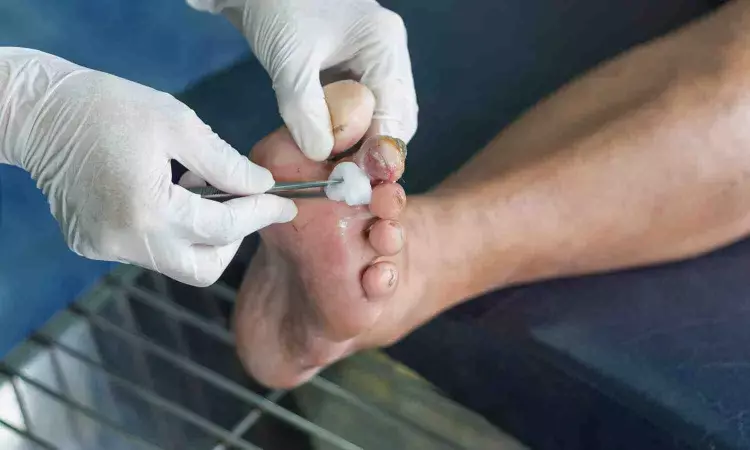- Home
- Medical news & Guidelines
- Anesthesiology
- Cardiology and CTVS
- Critical Care
- Dentistry
- Dermatology
- Diabetes and Endocrinology
- ENT
- Gastroenterology
- Medicine
- Nephrology
- Neurology
- Obstretics-Gynaecology
- Oncology
- Ophthalmology
- Orthopaedics
- Pediatrics-Neonatology
- Psychiatry
- Pulmonology
- Radiology
- Surgery
- Urology
- Laboratory Medicine
- Diet
- Nursing
- Paramedical
- Physiotherapy
- Health news
- Fact Check
- Bone Health Fact Check
- Brain Health Fact Check
- Cancer Related Fact Check
- Child Care Fact Check
- Dental and oral health fact check
- Diabetes and metabolic health fact check
- Diet and Nutrition Fact Check
- Eye and ENT Care Fact Check
- Fitness fact check
- Gut health fact check
- Heart health fact check
- Kidney health fact check
- Medical education fact check
- Men's health fact check
- Respiratory fact check
- Skin and hair care fact check
- Vaccine and Immunization fact check
- Women's health fact check
- AYUSH
- State News
- Andaman and Nicobar Islands
- Andhra Pradesh
- Arunachal Pradesh
- Assam
- Bihar
- Chandigarh
- Chattisgarh
- Dadra and Nagar Haveli
- Daman and Diu
- Delhi
- Goa
- Gujarat
- Haryana
- Himachal Pradesh
- Jammu & Kashmir
- Jharkhand
- Karnataka
- Kerala
- Ladakh
- Lakshadweep
- Madhya Pradesh
- Maharashtra
- Manipur
- Meghalaya
- Mizoram
- Nagaland
- Odisha
- Puducherry
- Punjab
- Rajasthan
- Sikkim
- Tamil Nadu
- Telangana
- Tripura
- Uttar Pradesh
- Uttrakhand
- West Bengal
- Medical Education
- Industry
Botanical-Based Hydrogel Promising in Treating Diabetic Foot Ulcers, Finds New Study

USA: A study published in the Journal of Wound Care has revealed that a botanical-based hydrogel was as effective as standard hydrogel in treating diabetic foot ulcers. In a trial involving 65 patients, the botanical gel provided greater pain relief and better reduction in wound surface area.
Led by Dr. Windy Cole, DPM, CWSP, FFPM (Glasg), Adjunct Professor at Kent State University College of Podiatric Medicine, the research explored the therapeutic benefits of a plant-based wound gel—LAVIOR Diabetic Wound Gel (LDWG)—in comparison to a widely used standard product, SoloSite Wound Gel (SSWG). The prospective, double-blind, randomized controlled trial involved 65 participants with diabetic foot ulcers (DFUs), a notoriously difficult-to-heal complication of diabetes.
Patients were randomly assigned to one of two groups: 34 received treatment with the botanical LDWG, while 31 were treated with the standard SSWG. Both groups were monitored weekly over six weeks, with progress assessed through wound surface measurements, pain levels, and scores from the Diabetic Foot Scale (DFS)—a validated tool for evaluating patient-reported outcomes in DFU care.
The study revealed the following findings:
- Both hydrogels supported wound healing in diabetic foot ulcers.
- The botanical hydrogel (LDWG) led to a greater reduction in wound surface area, from an average of 7.32 cm² to 2.24 cm², compared to a reduction from 8.18 cm² to 5.16 cm² with the standard hydrogel.
- Although the difference in wound size reduction was not statistically significant, the trend favored LDWG.
- Patients treated with LDWG reported significantly greater pain relief during the first four weeks of follow-up.
- The botanical gel group also showed greater improvement in quality-of-life scores, with a higher increase in Diabetic Foot Scale (DFS) scores (219 vs. 192).
- Wound closure times were similar in both treatment groups.
“The study reinforces the potential of botanical hydrogels like LDWG in managing hard-to-heal wounds such as diabetic foot ulcers,” the authors noted. “Particularly, the pain reduction benefits and consistent wound healing progression suggest that LDWG could serve as a valuable tool in wound care.”
Despite encouraging results, the researchers acknowledge limitations. The relatively small sample size and a short follow-up period of five weeks may not fully capture long-term healing trends, especially in chronic wounds. The team suggests that larger, multicenter trials are essential to confirm these early findings and explore the broader applications of Inula viscosa ‘AGS-RIED’, the botanical extract used in LDWG.
"While both treatment options proved beneficial, LDWG not only matched the traditional hydrogel in healing diabetic foot ulcers but also offered better pain control and promising wound reduction outcomes. These findings support further research into botanical-based solutions as viable, patient-friendly alternatives in wound management," the authors concluded.
Reference:
Bae SHS, Cole W, Davis IM, Sandler D, Warren JD, Mackenzie JS. Healing wounds with a multimodal botanical hydrogel: a clinical outcomes comparison study. J Wound Care. 2025 Jul 1;34(Sup7):S5-S12. doi: 10.12968/jowc.2025.0185. PMID: 40632779.
Dr Kamal Kant Kohli-MBBS, DTCD- a chest specialist with more than 30 years of practice and a flair for writing clinical articles, Dr Kamal Kant Kohli joined Medical Dialogues as a Chief Editor of Medical News. Besides writing articles, as an editor, he proofreads and verifies all the medical content published on Medical Dialogues including those coming from journals, studies,medical conferences,guidelines etc. Email: drkohli@medicaldialogues.in. Contact no. 011-43720751


